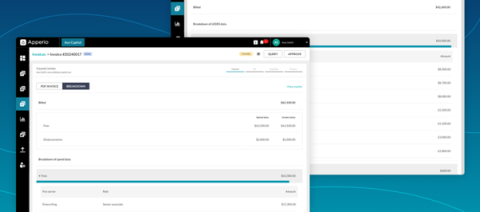Legal Spend Management vs e-Billing: Key Differences and Why PE Firms Need Both

Legal spend management goes beyond e-billing to help PE firms avoid unexpected invoices and control costs. Despite spending $10.5 million annually on outside legal fees, 80% of PE firms still face surprise invoices—a gap that highlights the limits of e-billing alone.
Ten million dollars in legal expenses is a tidy sum. Given private equity firms manage money for profit, how is it these organisations are caught off guard by law firm invoices?
Apperio founder Nicholas d'Adhemar shared an anecdote that provides some context, from his days as an investment manager at a PE firm.
When the investment team saw a deal opportunity they wanted to pursue, they’d meet with their law firm of choice. At that meeting, they’d agree on the matter’s needs and get an estimated cost for those legal services from the law firm. Then, they’d all put their heads down and work on the deal.
As the closing approached, everyone supporting the deal would be busier and busier. And that’s usually when it occurred: the law firm would produce an invoice and say, ‘I know we told you the cost of legal services for would be $300,000 but here’s an invoice for the $1 million we booked on the clock.’
Sure, an e-billing system with a proper ruleset would likely reject that invoice, but what happens next? Both sides negotiate – sometimes with more adversarial vigour than one might prefer in a relationship business like law – and chances are the firm writes-down 10% of the invoice.
But what’s a 10% discount worth if the total sum of the work wasn’t necessary? For example, with an invoice three times the expected value, perhaps there is legal work that shouldn’t be done, or should have been done differently, or would be better served by a different law firm with a different specialty.
It would have been nice to know that was happening – when it was happening – but that’s not a capability e-billing tools can provide. These tools are quite good at what they do, but an e-billing analysis is like a photograph: the event already occurred.
Why legal spend management needs a proactive approach
E-billing is a part of legal spend management, and because it’s the dominant tool in the category, the terms are often used synonymously. Unfortunately, that can lead in-house lawyers to overlook other more proactive ways to manage legal costs.
One technique that’s proving results is a legal spend management platform that connects directly to a law firm’s practice management system. This provides instant visibility into both historical spend and unbilled legal work, such as work-in-progress (WIP). With current data about their budget and matters, the legal department can make better decisions driving better legal outcomes – and avoid those surprise invoices altogether.
It’s a more collaborative approach too. Where e-billing is centred on transactions and invoice rejections, a proactive approach to legal spend facilitates a discussion, about matters, performance and budget, before there’s an issue.
Key differences between legal spend management and e-billing
Here are some of the similarities between e-billing and a proactive approach to legal spend management:
- Both strive to standardise legal data around budget, expenses and matters.
- Both facilitate a financial dialogue between in-house and outside counsel.
- Both foster better data hygiene around coding and narratives.
- Both encourage better time-entry among billing attorneys.
- Both are focused on managing legal budgets more efficiently.
Here are some of the differences between e-billing and a proactive approach to legal spend management:
- E-billing is a bottom-up approach where a proactive approach is top-down.
- E-billing centres on invoices where a proactive approach centres on budget.
- E-billing focuses on transactions where a proactive approach focuses on status.
- E-billing analyses historical data where a proactive approach analyses real-time data.
- E-billing facilitates invoice rejection where a proactive approach facilitates legal agility.
- E-billing tends to be adversarial where a proactive approach is collaborative.
- E-billing can take years to implement where a proactive approach takes days.
Did you hear? Apperio unveils groundbreaking enhancements to revolutionize legal data collection and analysis, now addressing the whole e-billing market. Read more here.🖱
The role of legal spend management in Private Equity Firms
E-billing tools brought much-needed digitisation to the legal market over a decade ago, providing essential support for firms managing high volumes of legal invoices. Yet, these tools are inherently retrospective—they alert you to spending after the fact. For Private Equity (PE) firms handling substantial legal budgets, e-billing alone will not be enough to prevent surprise invoices and risks slowing down the business of PE—doing deals.
True legal spend management goes beyond invoicing. It offers real-time visibility across historical data and unbilled work-in-progress (WIP), allowing PE firms to track and control costs as they accrue. This proactive approach provides the transparency needed to make informed decisions throughout a matter, aligning legal budgets and reducing the risk of unexpected expenses, without requiring lengthy workflows that get in the way of important legal work.
Beyond e-Billing: Embracing full legal spend management
For firms managing complex and high-cost matters, e-billing on its own isn’t enough to prevent budget surprises. A proactive legal spend management approach offers real-time visibility across both historical costs and unbilled work-in-progress (WIP), giving firms the insights they need to stay aligned with budgets and business goals.
By moving beyond basic invoice tracking, PE firms can gain more control over legal costs, spot potential issues before they escalate, and build stronger, more transparent relationships with law firms. Legal spend management lets teams stay ahead, making budgeting less of a guessing game and more of a strategic tool.
Ready to see how Apperio can help your firm manage legal spend with confidence? Get in touch to learn more: info@apperio.com.
Your next steps to better legal spend management
The Apperio platform offers a proactive approach to legal spend management, now enhanced with new, groundbreaking features:
- Apperio BillClear – Apperio’s latest innovation that gives all the value of e-billing with none of the work. BillClear flags e-billing type violations to the law firm before submitting an invoice. This means the law firm can write down or correct issues before fully submitting. This helps reduce all the effort in rejecting or short-paying invoices with flags and improves compliance throughout the process.
- Three tiers of data connectivity – Access a tailored approach to legal spend insights:
- Tier 1: Real-time data connections for live access to WIP and accruals, enabling proactive decision-making and strengthened relationships.
- Tier 2: Long tail data collection (new!), bringing LEDES data capture to the entire e-billing market, increasing efficiency and reducing time-to-value.
- Tier 3: Invoice-only data capture for low-volume needs, ensuring flexibility without compromising on accuracy.
- AI-powered invoice insights – Coming soon, Apperio’s second-generation AI will offer automated invoice review and GenBI reporting, delivering accurate, OCG-compliant invoices and actionable insights.
With over 250 global law firm partners, Apperio is redefining the boundaries of legal spend management and giving in-house teams the visibility and control they need to manage legal budgets effectively.
👉 Want to see Apperio in action? Schedule a live demo by emailing info@apperio.com.

Looking for more guidance? Take a look at these blogs:
- Supercharge e-billing and automate accruals for your finance team
- 6 signs you've outgrown your e-billing system
- AI is killing e-billing - what comes next?